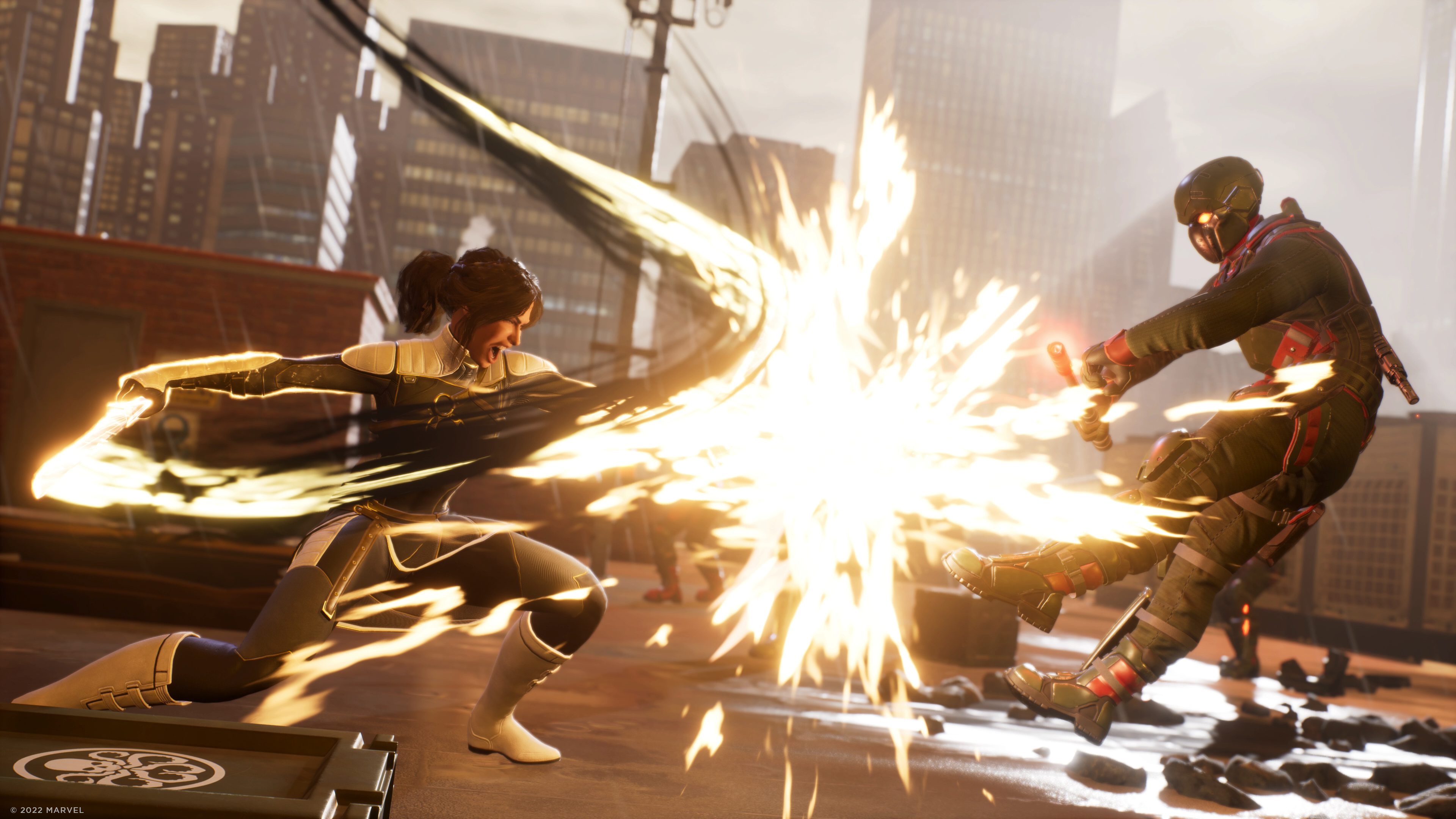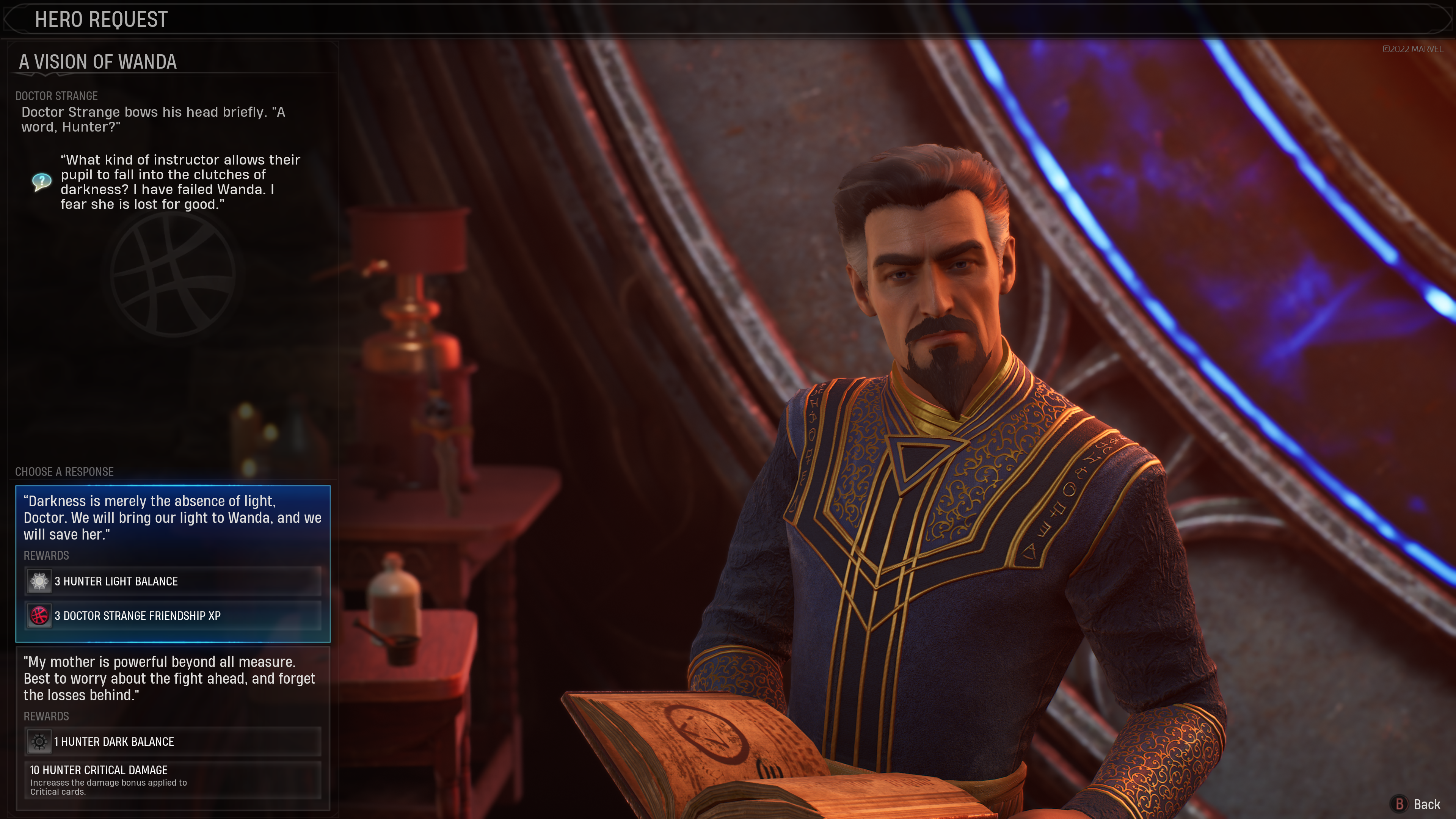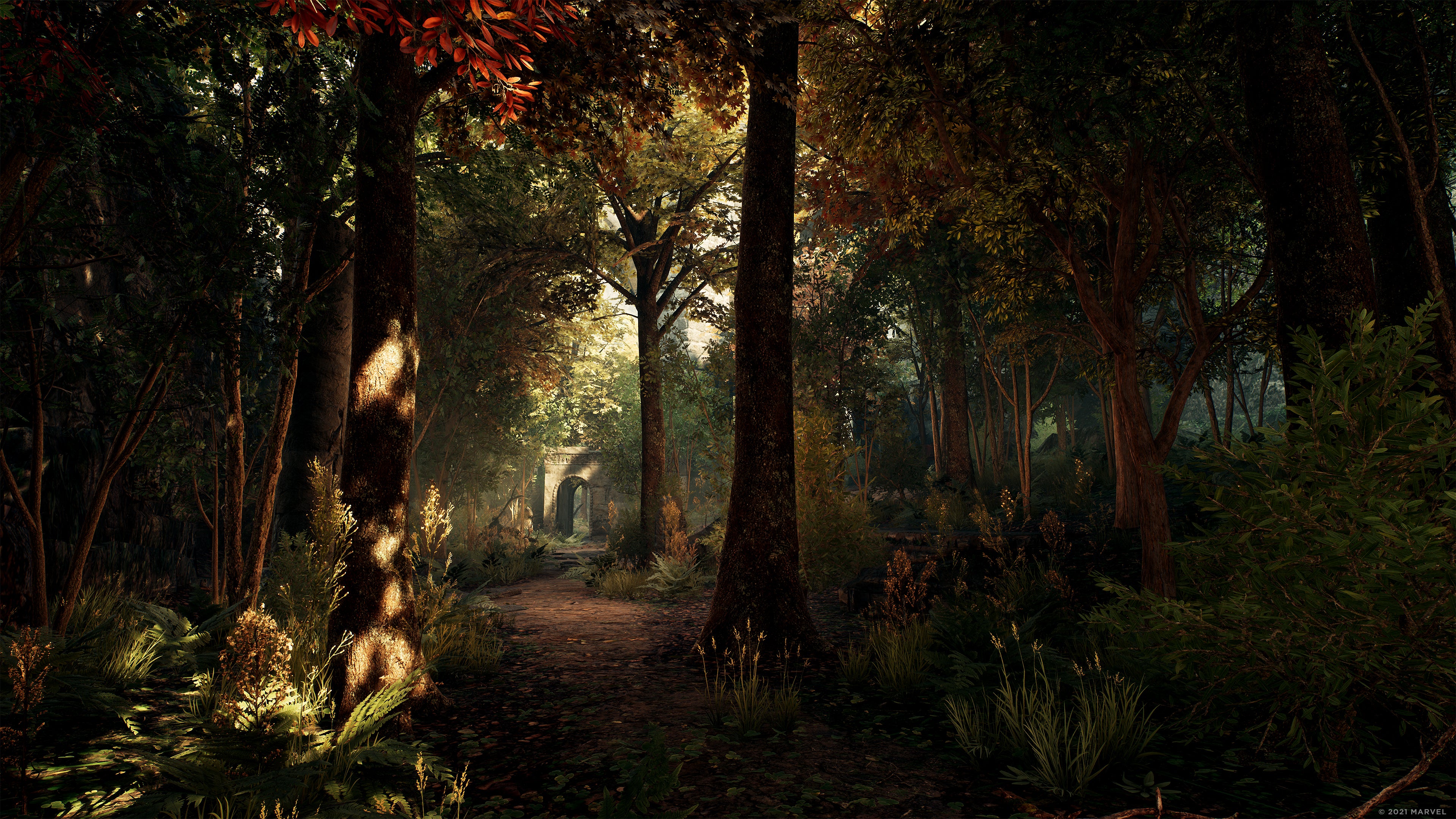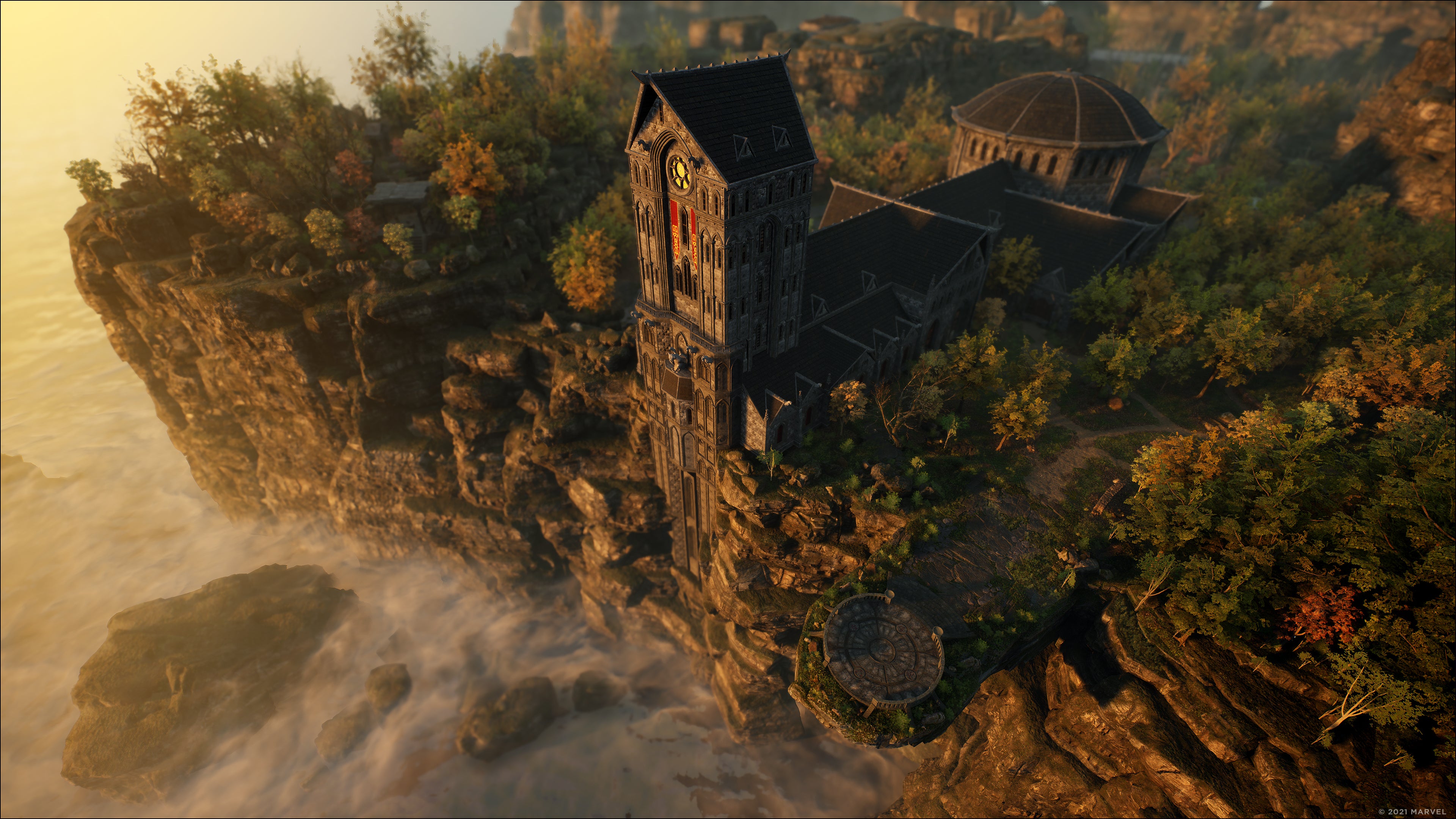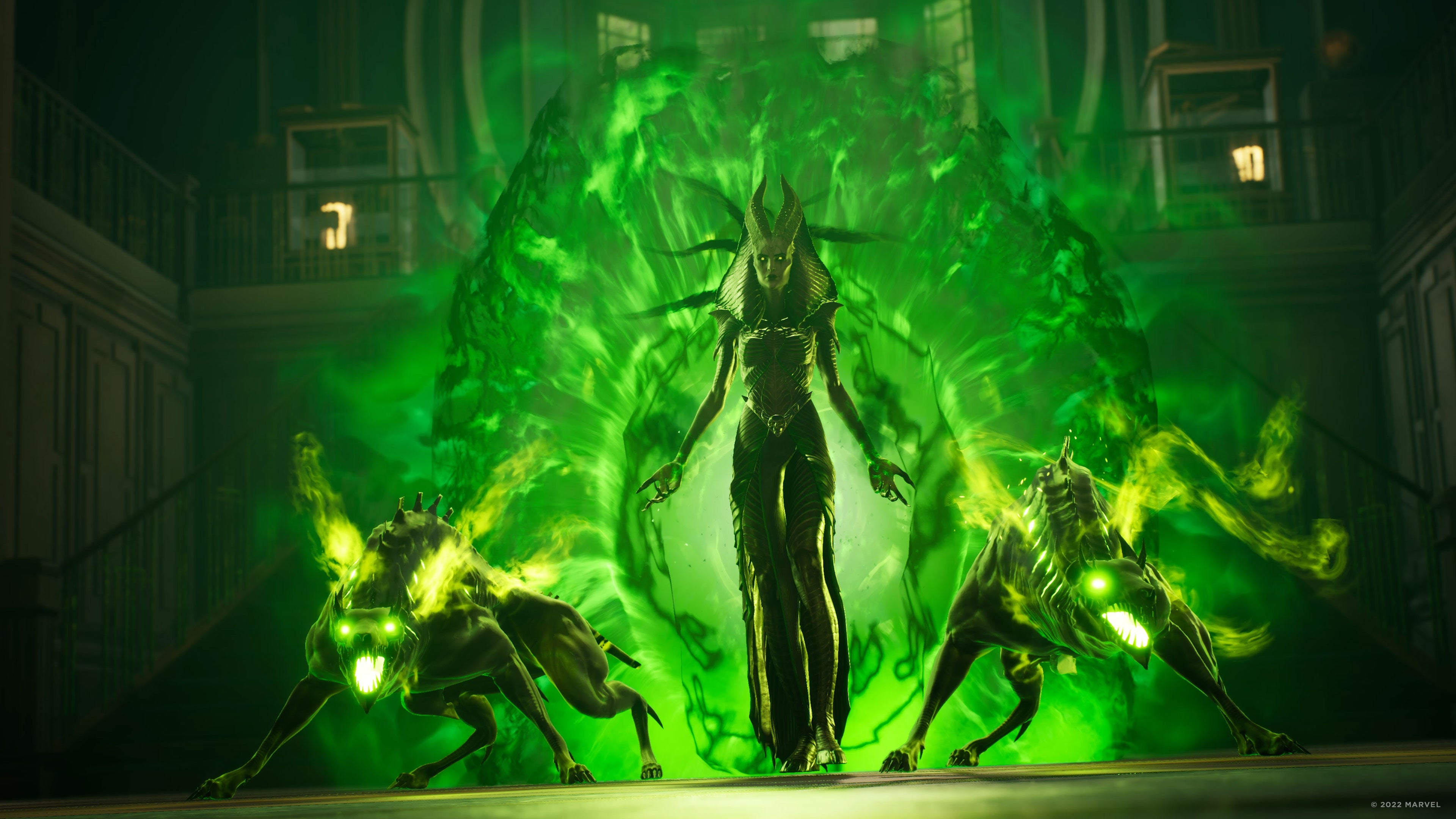To be even clearer: I did not expect to love this game. From the trailers, to the marketing, to the extensive 15-minute presentation shown ahead of getting our review code that felt like the kind of XCOM mission briefing you get right before an extremely Not Fun time, Midnight Suns has felt like a project with an identity crisis. It’s a little bit XCOM, but with Slay the Spire’s tactical card battling, the relationship management of Fire Emblem, the choice and consequence HQ politics of Dragon Age and/or Mass Effect, and there’s even a bit of Walking Simulator in there where you mooch about some woods figuring out how to unlock doors while piecing together disparate fragments of plot. It’s a lot. And I haven’t even mentioned how many currencies there are in this game. Dozens of collectible resources like “skill essence”, “gloss”, or “intel”, which all have specific types of thing that they’re spent on. Arcane keys which unlock the various loot boxes dotted around your headquarters and its environs: The Abbey and its lush, knotted grounds. Basically this game’s equivalent of the SS Normandy except it’s a national heritage site and Iron Man lives there. You’d be forgiven after a quick glance for thinking that it was a live service game. It may well have been at some point in its development history, and all these currencies and collectibles could be the leftover detritus of such a plan. Possibly. Maybe. But no. It’s just a game that gives you a lot of plates to spin. Which seems like it should be overwhelming, but rest assured: you just pick it up as you go along. It becomes frightfully instinctive, frightfully quickly. The least helpful thing a reviewer could do here is go into detail about every number on the game’s internal spreadsheet and what it means, because it doesn’t really matter in the minute-to-minute gameplay. This is in no small part due to Firaxis’ work on the clear, clean UI, which makes smooth work of navigating the game’s clear, clean mission objectives and narrative goals. It is their most accessible game to date, perhaps necessitated by the mainstream popularity of the license. It’s certainly more forgiving than XCOM, and feels deftly engineered to make the player feel smart, or lucky, without really challenging them too much. It is possible to fumble through most encounters and recover from stupid decisions, even decisions as fundamental as choosing team members which don’t complement each other particularly well. XCOM would punish you for the most minor slip-ups, but Midnight Suns doesn’t want you to ponder the human cost of war, it wants you to feel like the Russos directing a hyper-choreographed fight sequence in an Avengers movie. That incredible popcorn ballet of acrobatic stunts and absurdly unlikely teamwork, where each member of the team uses their signature talent to create chances that their super colleagues instinctively know how to exploit. Iron Man sets ‘em up, and Cap knocks ‘em down, etc. There’s no cover system to speak of and the battle arenas are small, tight spaces rather than vast, sprawling levels. This isn’t about hunkering down behind a bit of scenery and picking foes off from a distance, this is about Spider-Man clobbering people. It’s close-quarters, up close, and personal. Battle scenarios typically pit your choice of three heroes (from a potential roster of 13) against a pack of Hydra agents, or some big bastard, in a tense bar room brawl style affair where you are extremely encouraged to shove people into bits of scenery or whack them over the head with crates as much as you’re invited to play your card deck. Unlike XCOM, there are no dice rolls when it comes to landing blows. The biggest element of random chance is in which cards are drawn at the start of each turn: this will determine your available moveset for each character. Every hero has their own character deck, these are combined into one at the start of a battle. Cards can be attacks, support functions, crowd control, area effects, or modifiers. Some cards increase your heroism meter when played, and others cost heroism in order to cast. You can also spend heroism on environmental attacks, meaning that you can often still inflict damage on your opponents once your card plays are expended, potentially extending turns well beyond the meat of the move system. It’s a joyously fun and rewarding combat engine, which feels expertly tuned to deliver squeaky-bum moments where, for example, everything hinges on getting enough heroism points to play an expensive joint attack. Or, HP counts are down to the wire and one wrong move could cost either side the game, and the day is won by simply having Iron Man walk over and smash a prop over someone’s head like a vastly over-budget episode of Bottom. This, of course, makes you feel Good. Feeling good is, of course, what it’s all about. For the ensemble cast as well as the player, actually. Perhaps the most striking thing about Midnight Suns is its emphasis on what goes on between combat encounters. It’s a game of three halves: battle prep, missions, and down time, and they’re all equally important. Your time spent exploring The Abbey, building relationships with your fellow supes, helping them with their little projects and big struggles, is a significant chunk of the game, which is divided into days. Each one begins with your customisable character, The Hunter (demon slayer daughter of Lilith, an original character invented for this game), waking up in their fully customisable bedroom, and getting on with the various jobs that need doing before that day’s tussle with Hydra. Your morning routine is entirely up to you: you can do a bit of sparring, examine the previous day’s spoils, tweak everyone’s decks and combine cards to make more powerful ones, check in with Captain Marvel to see if there are any intelligence missions you can send someone on, or take part in the various interpersonal dramas that are always unfolding when the opportunity arises, usually via the Stark Industries equivalent of WhatsApp. See, Nico wants to throw Magik a surprise birthday party, but Blade doesn’t think it’s a good idea, because Magik doesn’t like surprises, Peter Parker meanwhile is worried about fitting in with the group, and so… look, it’s brilliant. It’s a veritable Barbie’s Dreamhouse of superhero soap opera, in which you tease Blade over a crush he has, or coach Ghost Rider through a crisis of confidence. After you’ve trained, tweaked your deck, and sent Spider-Man on a solo mission to help Ms. Marvel uncover the thing in the wherever, it’s time to go and choose a mission from the war table, Dragon Age: Inquisition style. Once you’ve battered whoever needs battering, you return to The Abbey in the evening time, where Midnight Suns demonstrates a refreshing commitment to a healthy work/life balance: no more Work Stuff can be done after home time. Examining the spoils has to wait until the next day. Now it’s time to hang out with the crew, and explore the Abbey’s enormous grounds, which is a whole other surprisingly fleshed-out thing that could be a game in its own right. So, you can spend your evenings uncovering a centuries old mystery about the witches of Salem. You can go fishing with Captain America. You can pick mushrooms with Magik. You can relax by the pool with Captain Marvel and talk about your feelings. Building these relationships grants rewards in the form of combat bonuses and stat boosts, which have a discernible effect on the combat mission part of the game, but arguably have a much more profound effect on you, the player, in giving you a personal stake in the personal lives of a bunch of comic book characters. These extraordinary people whom you have somehow ended up living in a big creepy church with, who can perform extraordinary feats of super-powered heroism, and then confide in you about their struggle with alcoholism a few hours later. And that’s the game’s biggest strength, really. It’s certainly what elevates it above Firaxis’ other (excellent) strategy games, for my money: it makes you care. Midnight Suns is that rare sort of game that genuinely has something for everyone. Fans of Firaxis games will find enough of XCOM’s DNA in here to make it worth their while. Proponents of card battlers (yes, including Marvel Snap, which this game will inevitable be compared to but honestly isn’t much like) will love its heady balance of chance creation and follow-through. And those of us who adore choice and consequence RPGs for their quieter moments, be it the downtime on the Normandy or the relationship sim part of Persona 5 (fill in your own pertinent examples), will absolutely find a new home away from home in The Abbey, where we get to fulfil the childhood fantasy of actually being Spider-Man‘s roommate, Blade’s sparring buddy, or Doctor Strange’s… fellow book enjoyer. Even those of us suffering from immense MCU fatigue (which is, like, everyone by this point, right?) will probably find Midnight Suns refreshing, as it focuses on the Dark Magick side of the Marvel mythos that hasn’t really been mined for content as much as the big hitters have, and though the characters in this game are clearly inspired by their MCU counterparts, the world state absolutely isn’t. Continuity doesn’t matter here. It’s as stand-alone as a Marvel adaptation possibly can be, and no prior knowledge is assumed. You can absolutely just enjoy the ride, even if you have no idea why there’s two Ghost Riders. It’s just a slight shame that The Abbey seems to be situated slap-bang in the middle of the uncanny valley. For conversations to be such an important part of the game, and then for them to be let down by stiffly animated, plasticine-looking character models, is like watching an injury-time goal getting disallowed for being a little bit offside. Barely missing the mark because of something you don’t wish to be important, but is. It’s almost as if Firaxis just isn’t used to having the camera this low down. And it really is a shame, because in almost every other respect, Midnight Suns is a looker: its mission gameplay is adorned with lavish move animations, where light ripples and slides across each hero’s armour in a manner befitting the modern myths that they are. Particle effects shoom across the screen like comics come to life. The Abbey and its grounds are gorgeously lit: mossy stones glisten in the soft moonlight, a forge radiates with the intense glow of a trapped fire demon. And yet, the faces don’t hold up in a simple two-shot. However, that’s a bit of a nitpick. Possibly the worst of my career. Midnight Suns is honestly a brilliant bloody time: an extremely fun tactical RPG nestled amongst an adorably wholesome relationship simulator. A superhero game which understands that the appeal of comics is often much less about punching Venom than it is about seeing a bunch of daft looking folk cutting about in a big house, being nice to each other, bickering about leaving towels on the floor. Real stuff. Relatable stuff. The stuff of life. But you get to punch Venom a lot too. Everybody wins, except the baddies.
